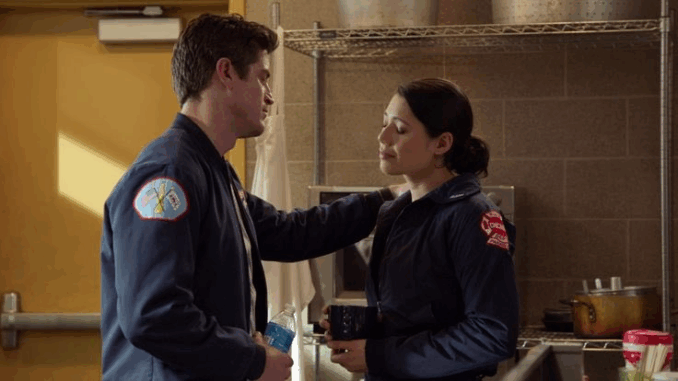
Why did Chicago Fire repeat the Brettsey arc with Violet and Carver? And why are fans so frustrated about it?
We’ve been here before — too recently, and with too much emotional investment. Violet and Carver’s relationship seemed to be heating up, only for the show to throw cold water on it with a finale twist that felt suspiciously familiar.
So let’s break it down — because we all have questions, and they’re valid.
Did Violet and Carver just go through the same storyline as Casey and Brett?
- Brettsey (Casey and Brett) slowly built toward romance over several seasons, finally getting together during Chicago Fire Season 9.
- But after Casey left for Oregon in Season 10, their long-distance relationship fizzled. Brett eventually ended things, even though they still loved each other.
- In the Chicago Fire Season 12 finale, they reunited and decided to build a life together — but not in Chicago
Now, fast-forward to Chicago Fire Season 13, and we’re watching Violet and Carver… do the same thing.
- Their chemistry sparked in Season 11 and Season 12.
- They danced around their feelings.
- Just as Violet admitted she loved him, Carver said he was leaving 51.
Fans immediately recognized the pattern — and not in a good way. And when you consider that Violet and Carver first talked about their future at Bretty’s wedding, the irony is inescapable.
Why does this storyline feel worse the second time around?
Because we let our guard down.
Unlike Casey and Brett, Violet and Carver aren’t legacy characters.
They weren’t around in Chicago Fire Season 1, but they have been in the fold long enough to feel rooted. Importantly, they’re not massive stars the show needs to accommodate contract-wise.
That gave us a false sense of security.
We assumed their arc would be safe from last-minute exits and heartbreak-for-heartbreak’s-sake storytelling. We assumed we could invest in them.
Instead, we were set up for the same gut punch as before — just faster and with less emotional payoff.
Why does Chicago Fire keep doing this to its couples?
![BT下载][芝加哥烈焰第十二季][第06集][WEB-MKV/1.34G][中文字幕][1080P][流媒体][BlackTV]-电视剧集-BT之家1LOU站-回归初心,追求极简](https://www.1lou.me/upload/attach/202403/20911_9D3FWYFDE9K32RS.png)
That’s the million-dollar question.
We get it: not every relationship has to be endgame. Breakups are part of life, especially in high-pressure jobs like firefighting. But this pattern has gone beyond realism and into repetition.
If a couple builds real chemistry, someone gets hurt. If someone says “I love you,” someone leaves. If we get attached, the rug gets yanked out from under us.
And we’re starting to notice.
How are we supposed to care about personal arcs anymore?
That’s what’s most frustrating.
When every romance ends in death, withdrawal, or relocation, how are we supposed to trust what we’re seeing?
Is there room for love stories that grow instead of implode? Or are we only allowed to invest in Stellaride or Mouch and Platt because everyone else is just a narrative pawn?
We’re not asking for fairy tales. We’re just asking for stability — something to believe in. Something to root for that won’t be scrapped when the next season rolls around.
Is cast turnover the real reason these arcs fall apart?
In part, yes.
We know real-life logistics play a role. Actors leave, contracts end, and characters have to exit.
But when storylines start to feel copy-pasted — especially in their emotional beats — it becomes harder to buy into the idea that it’s just about scheduling.
At that point, it starts looking like the show doesn’t trust its own couples — or worse, doesn’t think we’ll notice the recycling.